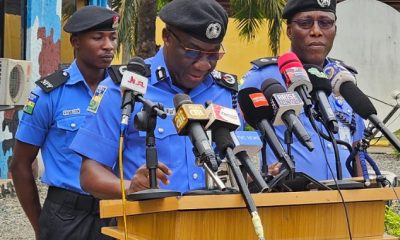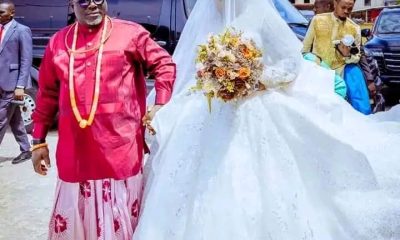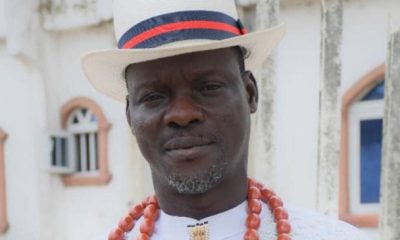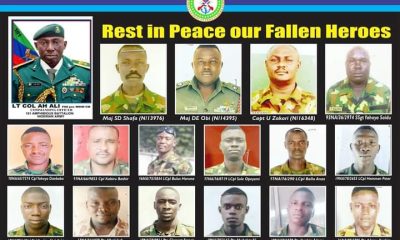Opinion
My marriage on canoe most historic adventure in N/Delta -Asiayei (Interview)
By Ayibapriye Ozobo
Events make history. Man’s ability to harness harrowing situations makes him unique. The floods of this year were unprecedented as communities were badly affected, including Akparemogbene — the harnessed glory centre today. In this exclusive interview with the managing editor of Gbaramatuvoice, Enaibo Asiayei who performed his traditional marriage rites in a canoe in the flooded riverine community of Akaparemogbene in Burutu Local Government Area, we shall be taken memory lane on how this rare adventure was achieved.

_•Please tell us your name._
My name is Mr. Asiayei Enaibo aka, the Talking Drum of the Niger Delta. The Talking Drum is a household name, and very popular. I am a journalist and a researcher in the Niger Delta region who is currently working with the GbaramatuVoice Media Organization as the Managing Editor for the past seven years. In the course of my duty as a journalist, through GbaramatuVoice, I have gone around almost all the creeks and towns in Delta, Bayelsa, Ondo, and Edo states. The Ijaw region is blessed with an abundance of natural resources of oil, a forest full of riches, but a region full of poverty. Yes, I am from Bobougbene, Ayakoromo, and Obotebe communities both in Burutu LGA of Delta State.

_•You recently paid your wife’s bride price in a canoe. Is it true?_
Yes, I did. It was an uncommon adventure. Very challenging and not everyone would like to undertake it. Though, I saw it as a pleasure trip. The area is as good as a tourism centre, one could feel the natural air and vegetation. It was a fun-making tour as my wife and I began to dance in a canoe.

• _So what was your experience with the canoe celebration?
First, my experience as a groom who made the traditional marriage rites on a canoe in the Akparemogbene community in Burutu LGA was the first of its kind. And my wife Emily Tam Ekanpou, I didn’t plan for it. We hoped that before the dowry payment date, the ravaging flood would have gone, but unfortunately, the flood kept increasing. At the time we realized that the flood would not go down before the marriage date, we had already put in lots of financial commitment in all the plans, so we allowed nature to take its course because what is naturally designed cosmically cannot be reversed by man. So we got to my in-laws’ community and the water level was life-threatening. We had to do it.
Before the payment, as Ijaw people, we are conscious of the laid down tradition that if you are getting married to an Ijaw girl, no matter how far the village of the parents could be, you have to go to the community where their daughter was born and grew up for marriage. You go there! As for the people, the father, and the kinsmen in the community must identify who is coming to marry their daughter, for the whole community to become aware that it was Mr. Enaibo that is marrying the daughter of Mr. Ekanpou Gowon.
Concerning her family root and the entire community, if any community person sees you anywhere, they will honor you that this is our in-law, so the Ijaw people believe in this for a long time now, so we are in due course to do what is traditionally right.

_• Did you feel excited?
I was very excited. I prepared for the ugly and unpleasant situation to go to do what has not been recorded in the Ijaw history, marriage on a canoe under a ravaging flood where there was no land to pay my wife’s dowry. I as the husband, when we arrived from Warri, my wife was in a separate boat, then myself and the GbaramatuVoice team led by my boss, the Publisher—Mr. Jacob Abai was in another boat. How possible can we be in this flood to pay the dowry of Emily Tamaraubrakaemi Ekanpou? The family too was highly prepared to raise a small platform for us to pay the dowry. All the community people came with their canoes, some were seated on the canoe, and my family and guests were all on the canoe. Initially, my elder sisters were not happy that their brother is coming for the traditional marriage of his beloved wife and they (the family) cannot even dance to rejoice with their wife, that they were furious that things should be done in Warri. So I asked my family members that the whole of this flood in Burutu LGA, there is no IDP camp to move those in the village to the upland, the whole of Akparamogbene people are sleeping on a canoe as the flood is above roof level, and no matter how this could be, let us respect the family’s decision and go down there to pay the dowry. Yes, we got there and their drinks were on the canoe, family escorted their daughter on a canoe, and I danced on the canoe. It was a fantastic experience for me as the husband, a very lovely moment, my wife was worth my new experience for her calm and humane disposition.

•What is your message to the government on how to address flood challenges in the riverine areas of Delta, especially Akparemogbene and its neighboring communities?
Talking about the government catering to the people in the riverine area has been a major challenge. Government is nonchalant about the Ijaw people living in the coastal areas, whether the people are dying or not, it is never their business, except election time, which is when they know there are people in the village, let’s go and get their votes.
In Burutu Local Government, there are no IDP camps to cater to people; children, aged men, and women were left on tree tops and canoes to survive the ravaging flood. That is a big challenge of the century. The Delta State Government should be proactive in dealing with the riverine people, the challenges are too much, from drinking water to electricity, health care, good school, and other social amenities. No road network for easy flow of the market. It is too bad, we have been experiencing worse times as coastal people but this one is the worst, as properties and houses are collapsing, no support after the flood.
_•People were saying you should have postponed it. What is your take on that?
Yes, being an Ijaw man, we are riverine people. Flood has been our major challenge in times like this; we have coped with it and we lived with it. We have called on the government to help us in filling our communities but this call is yet to receive a response. The flood itself is aware that Ijaw people cope with it no matter the havoc it has caused in their homes. We have planned it, the flood was massive and it wasn’t leaving us to do as planned, so we too will not allow the flood to defeat or disorganized our plans. The flood was a natural and unusual disaster; the traditional marriage plans are the natural rights of a man. Two natural elements met, so the superior natural plan took the day. That is me and my wife, conquered the flood and went ahead to perform our traditional marriage rites, which I wrote an article about, it is Time to pay my wife’s Debt, so postponing it is like a mission impossible. It was a fantastic one that with this brave act the flood too will be afraid of us; not everything we lose hope. Set your plans and conquer in the face of adversity.
And we triumphantly made the first history in the whole of Ijaw as the first Delta couple to get married on a canoe. We made this history unconsciously, and we did it for the whole world to know that 2022 flood in Delta, marriage on a canoe, yes because of the interior and lack of government presence in our villages like Bobougbene, Akparamogbene, Oyangbene, Eseimogbene, women have gone through delivery on the canoe while doing their fishing expedition. So marriage on a canoe, which can’t happen in Ijaw areas does not exist, so despite the flood, no postponement, and we were the happiest people on that day, the 3rd of November 2022.
• _Where were the dancing and other activities performed, was it on the canoe?
I have early thought that at this critical situation of the flood beyond what was thought, there would be no place to dance. I was told by my wife’s family, the Ekanpou family, that I should come to pay the dowry with five persons from my family, and before now, the whole of my community, Bobougbene, had planned to storm Akparamogbene community with local boats, and dance from home as their illustrious son was getting married. This was because of my impeccable role in community development but the flood refused to go. The community chairman and others called me to help them postpone the dowry payment the reason no place for them to dance and rejoice with us. I told them no, we are not going to postpone it.
So we came from Warri to my community, altogether about 30 persons in two-speed boats; one was taken by the publisher of the GbaramatuVoice, and the other for me and my family members.
Yes, my wife’s family knew that there is no land to stand to pay the dowry, they arranged canoes, and also set up a small platform which they warned is strictly for a few persons or the platform will fall and which means all the drinks and items for the day will be taken over by the flood. So all other things were on the canoe, and a few climbed the platform, paid for the items, and returned to their canoes. That is where I could dance because I have paid my wife’s debt I have been owing for a long time.
My wife was not willing to dance on the canoe, but as for me who paid the almighty marital debt off my head, I was excited that I have conquered the most dreaded flood in the history of Nigeria, as an internally displaced person where no one is safe in one way or the other. Yes, we used the canoe to do almost all the things on that day, my family escorted the bride with a canoe, and I was also brought through the canoe, so almost all the things were done on a canoe as the only alternative land to the Ijaw people.
_•What were your other challenges?_
Though the celebration went well, the plans were halted, and the risk on the boat for dowry payment was an unusual phenomenon, it was fun and interesting to me but a very challenging situation, not comfortable but we adapted to the situation and did everything well, and the family, there was no stress, the list that was given to me was followed accordingly. We couldn’t dance well as the Ijaw people in the Niger Delta region. When you have paid your wife’s dowry, good music will be played for you to dance with your wife, but those things were not there as part of the fun of the traditional marriage.
The flood was a great challenge to us all. The community people there were in a great predicament. In the mood of joy, you see the pain caused by the flood on their faces.
_•What is your advice on the situation?_
My message to the nation is that let us use our collective strength and brainstorm how we can assist ourselves, use our connection to help those who are in need, and let us always feel that what is happening in community A, could happen to community B. Some communities in Ijaw land are suffering beyond what you could describe. In Burutu, in this massive deadly flood, no definite IDP camps. Yes, the government should sand fill the Ijaw coastal communities and create a new town for them; a place where they can live in situations like this.
NDDC, Ministry of Niger Delta Region should work out a blueprint for post-flood plans before 2023 and how they could tackle situations of this nature. Both representative members should be proactive to look at what can be done to help the situation when things of this nature occur. This natural disaster was deadly and destructive.
My marriage on a canoe which has been the talk of the Niger Delta region as a result of the ravaging flood in Delta State, let me use this opportunity to appreciate all those who supported me financially, morally, and physically; they all made it a successful one. May God bless them abundantly for their hearts of kindness. Then the GbaramatuVoice media organization for making my traditional marriage video go viral as a typical portrayal of the rich Ijaw cultural heritage.
The flood obstacle could not affect our plans; to God be the glory!














